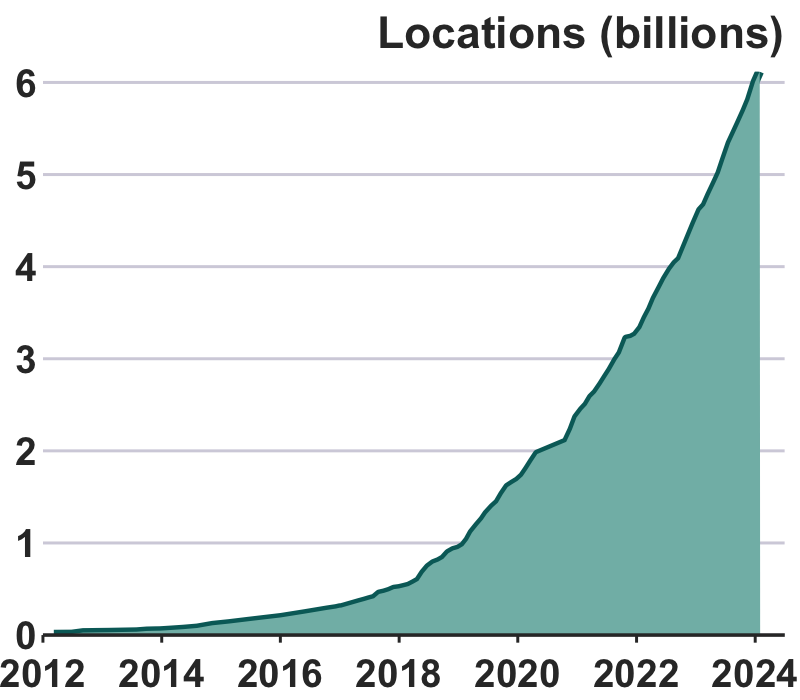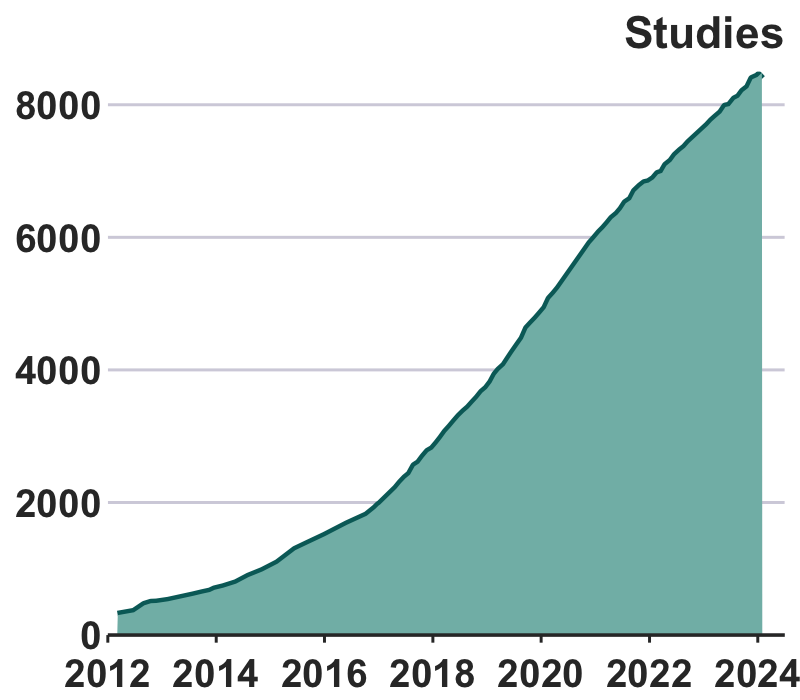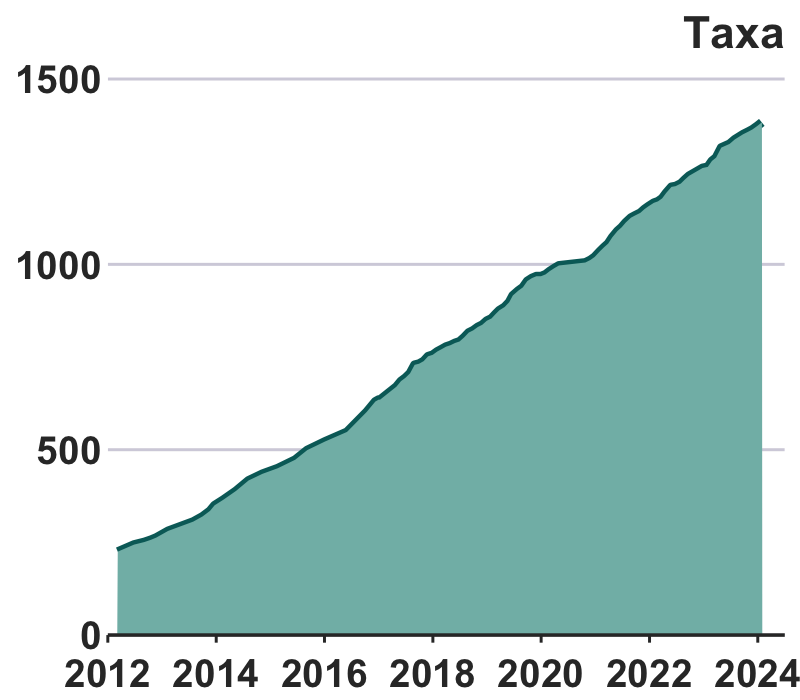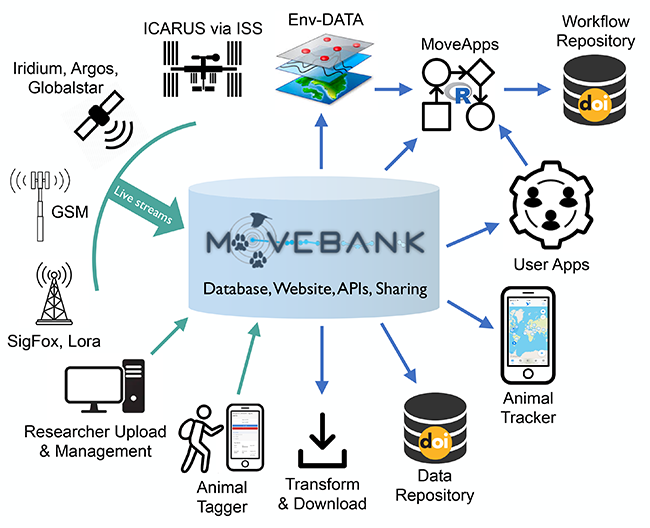About Movebank
Movebank is an online platform helping thousands of researchers and wildlife managers worldwide to manage, share, analyze and archive animal tracking and other animal-borne sensor data. Movebank is hosted by the Max Planck Institute of Animal Behavior in coordination with the North Carolina Museum of Natural Sciences, the Ohio State University and the University of Konstanz. Movebank partners with government agencies, universities and conservation organizations and is intended to serve as a global archive for animal movement and behavior. Movebank has long-term funding through the Max Planck Society and the University of Konstanz and has been developed with support from other generous funders.
Information about animal movements and behavior are used for movement ecology research, wildlife management, and to address challenges such as climate and land use change, biodiversity loss, invasive species, wildlife trafficking and infectious disease. However, working with animal tracking data remains a challenge due to a lack of standards and the growing size and complexity of multi-sensor datasets. Many datasets remain undiscoverable, poorly documented and may exist only on personal computers or in obsolete formats, including older work critical to documenting change over time. The Movebank project started in 2007 and was designed to help researchers effectively manage and publicly archive these unique data.
Movebank is open to data owners and organizations regardless of species, study area or source of funding. Movebank users retain ownership of their data and can choose whether and when to make their data available to the public. We encourage collaborations to re-use animal tracking data and give it a second life. Movebank's database is designed for locations of individual animals over time, measurements collected by other bio-logging sensors attached to animals, and information about related animals and methods. Movebank's continued growth is due both to an increasing number of users and to technological advances that allow the collection of increasingly high-resolution data and application to new species and environments.



As of January 2025, Movebank includes
- 8,843 studies
- 1,478 taxa
- 7.5 billion animal locations
- 7.4 billion other animal-borne sensor measurements
Goals
The goals of Movebank are to
- archive animal movement data for future use, as controlled by the data owners.
- enable collaborations between researchers, students, conservation organizations and governments who are interested in animal movement.
- help scientists address new questions by combining datasets to test ideas related to ecological patterns, evolutionary processes and disease spread.
- promote open access to animal movement data, in particular when the data collection is publicly funded.
- allow the public to explore the amazing animal movements recorded by animal trackers.
Services
Movebank offers a network of services centered on its database of animal-borne sensor measurements.

Those collecting data can add it to the database through uploading files or subscribing for automated feeds from over 30 tag manufacturers, manage data quality and information about study animals and methods, and share their data publicly or with select users. They can collect information in the field using the Animal Tagger mobile app and send it directly to Movebank, and connect with citizen scientists reporting updates on the lives of tracked animals using the Animal Tracker mobile app. They can also submit their data for publication in the Movebank Data Repository, a CoreTrustSeal certified repository that offers data citations, persistent identifiers (DOIs) and long-term public archiving through the Communication, Information, Media Centre of the University of Konstanz.
Data owners, the public and anyone granted access to non-public data can explore data through Movebank's website, the Animal Tracker mobile app, and resources developed by other groups using Movebank's APIs. For those seeking advanced, user-friendly analysis, the MoveApps platform offers automated data processing, analysis and visualization tools, and the Env-DATA System links data in Movebank to hundreds of environmental variables.
Funding
Movebank has long-term support from the Max Planck Institute of Animal Behavior, the Max Planck Society and the University of Konstanz. Additional funding has come from the organizations and awards listed below.
- Baden-Württemberg Ministerium für Wissenschaft, Forschung und Kunst (Baden-Württemberg Ministry for Science, Research and Art)
- EarthRanger 2022 Conservation Technology Award
- FAIRsFAIR Project
- German Aerospace Center (DLR) award for the ICARUS Ground Segment (50JR1601)
- German Research Foundation (DFG) (AOBJ 576687)
- The Knobloch Family Foundation*
- NASA Earth Science Division, Ecological Forecasting Program (projects NNX11AP61G, NNX15AT91A and 80NSSC21K1182*)
- National Geographic Society
- Netherlands Biodiversity Information Facility (NLBIF)
- United Nations Convention on the Conservation of Migratory Species of Wild Animals (Convention on Migratory Species)
- US National Science Foundation Division of Biological Infrastructure (awards 0756920 and 1564380)
*current
We invite you to contact us to discuss collaborating on funding opportunities and partnerships. In addition, we appreciate grant-funded contributions for data management and archiving services. If you are developing a research proposal and plan to rely on Movebank to collect or disseminate tracking data you will collect, we recommend including a small budget in the proposal to cover these costs. If funded, payment can be made at the start of the project through the Friends of the North Carolina Museum of Natural Sciences. We recognize that the budget and guidelines for funding opportunities vary widely, and contributions of any size are welcome. As an example, for a project deploying 50 tags that will use Movebank to collect data through a live feed and then organize and store the data for long-term dissemination, a budget of $1500 would help offset the costs of feed development, data storage, and support.
We can also help with wording for Data Management Plans associated with grant projects. Below is some suggested wording:
Dissemination: “The biologging data collected will be disseminated through Movebank. The study containing the data will be publicly discoverable, and upon completion of the project, the data will be made publicly available under a CC-BY license to allow long-term public access.”
For data that cannot be made public: “The study containing the data will be publicly discoverable, with the opportunity for interested parties to contact [the PI] to discuss possible data sharing, and share the data through Movebank if an agreement is made. Upon the retirement of [the PI], the contact will be updated to [a data steward] to address future requests for use.” A data steward is someone who could respond to manage data sharing, which might include your University’s library services, a permitting agency, or a younger researcher who inherits a research project.
Standards: “The tracking/biologging data and reference data describing deployments will be harmonized using the Movebank data model and following a persistent, machine-readable vocabulary (http://vocab.nerc.ac.uk/collection/MVB).”
If you plan to publish the data on GBIF or OBIS: “Data will be converted from the Movebank format to Darwin Core using the R package ‘movepub’ (Desmet, 2024) and published on GBIF/OBIS.”
Persistent identifiers: “We will submit the data to the Movebank Data Repository for archiving, including a data review, Creative Commons license, and DOI.”
Contact support@movebank.org with questions.
Current developments
Ongoing projects at Movebank include
- adding live feeds for additional tracking methods and data providers
- development of MoveApps, an open-source analysis platform
- building conservation partnerships and development of tools for on-the-ground conservation in cooperation with conservation and wildlife managers
- connecting biologists, data and tools in the Yukon-to-Yellowstone migration corridor with the Room to Roam project
- growing the Arctic Animal Movement Archive (AAMA) and development of the Yellowstone-to-Yukon Movement Archive to support collaborations addressing research, conservation and monitoring needs in these regions
- upgrades to the Movebank Data Repository
- participating in the Covid-19 Bio-Logging Initiative to study changes in animal movement and behavior in response to the pandemic-induced "anthropause"
Cite Movebank
To reference data stored in Movebank, see our citation guidelines, the general Movebank Terms of Use and user agreement.
The following references can be used to cite the general use of Movebank and core services.
To cite the Movebank platform:
Wikelski M, Davidson SC, Kays R. [year]. Movebank: archive, analysis and sharing of animal movement data. Hosted by the Max Planck Institute of Animal Behavior. www.movebank.org, accessed on [date].
Kays R, Davidson SC, Berger M, Bohrer G, Fiedler W, Flack A, Hirt J, Hahn C, Gauggel D, Russell B, et al. 2022. The Movebank system for studying global animal movement and demography. Methods Ecol Evol. 13(2):419-431. https://doi.org/10.1111/2041-210X.13767
To cite Movebank's data model:
Kranstauber B, Cameron A, Weinzierl R, Fountain T, Tilak S, Wikelski M, Kays R. 2011. The Movebank data model for animal tracking. Environ Model Softw. 26(6):834-835. https://doi.org/10.1016/j.envsoft.2010.12.005
To cite Movebank's data vocabulary:
Max Planck Institute of Animal Behavior. [year]. Movebank Attribute Dictionary. Natural Environment Research Council. http://vocab.nerc.ac.uk/collection/MVB/current accessed on [date].
To cite the the Env-DATA System:
Dodge S, Bohrer G, Weinzierl R, Davidson SC, Kays R, Douglas D, Cruz S, Han J, Brandes D, Wikelski M. 2013. The Environmental-Data Automated Track Annotation (Env-DATA) System: linking animal tracks with environmental data. Movement Ecology. 1:3. https://doi.org/10.1186/2051-3933-1-3
To cite MoveApps:
Kölzsch A, Davidson SC, Gauggel D, Hahn C, Hirt J, Kays R, Lang I, Lohr A, Russell B, Scharf AK, et al. 2022. MoveApps: a serverless no-code analysis platform for animal tracking data. Movement Ecol. 10(30). https://doi.org/10.1186/s40462-022-00327-4
Homepage credits
Photos
White storks (About us): Christian Ziegler
Fieldwork (News): Christian Ziegler
Radio tracking (Get started): Rob Nelson
Animation
The animation was created by 422 South using data from real tracked animals stored on Movebank. This animation follows white stork (Ciconia ciconia) nestlings and families migrating from Germany across the Mediterranean Sea and Sahara Desert to wintering grounds in Africa. Wildebeest (Connochaetes taurinus) range across the Loita Plains, Athi-Kaputiei Plains and Amboseli Basin of Kenya and Tanzania, and African buffalo (Syncerus caffer) and elephants (Loxodonta africana) travel through Kruger National Park, South Africa. As spring returns, the white storks migrate back north to Europe.
This video is licensed under CC BY 4.0 and may be used with attribution. We suggest the following citation:
422 South and Movebank. 2020. The wonders of animal tracking. Data from Boone RB, Bowers JA, Buss P, Cross PC, du Toit JT, Eggers U, Eid B, Fiedler W, Flack A, Getz WM, Hay CT, Hofmeyr M, Jeltsch F, Kaatz M, Keeves B, Leppelsack E, Leppelsack H, Lilieholm RJ, Nathan R, Ogutu JO, Quetting M, Reid RS, Rotics S, Sapir N, Schäfle W, Schmid H, Slotow R, Stabach J, Stahl T, Thaker M, Turjeman S, Vanak AT, Wieding O, Wikelski M, Wolhuter J, Worden JS, Zurell D, stored at https://movebank.org. https://youtu.be/0SbZfLOUcj0
The data shown come from the following studies:
Study Eastern flyway spring migration of adult white storks (data from Rotics et al. 2018)
Rotics S, Kaatz M, Turjeman S, Zurell D, Wikelski M, Sapir N, Eggers U, Fiedler W, Jeltsch F, Nathan R. 2018. Data from: Early arrival at breeding grounds: causes, costs and a trade-off with overwintering latitude. Movebank Data Repository. https://doi.org/10.5441/001/1.v8d24552
Study Kruger African Buffalo, GPS tracking, South Africa
Cross PC, Bowers JA, Hay CT, Wolhuter J, Buss P, Hofmeyr M, du Toit JT, Getz WM. 2016. Data from: Nonparameteric kernel methods for constructing home ranges and utilization distributions. Movebank Data Repository. https://doi.org/10.5441/001/1.j900f88t
Study LifeTrack White Stork Bavaria
Fiedler W, Leppelsack E, Leppelsack H, Stahl T, Wieding O, Wikelski M. 2019. Data from: Study "LifeTrack White Stork Bavaria" (2014-2019). Movebank Data Repository. https://doi.org/10.5441/001/1.v1cs4nn0
Study LifeTrack White Stork SW Germany
Fiedler W, Flack A, Schäfle W, Keeves B, Quetting M, Eid B, Schmid H, Wikelski M. 2019. Data from: Study "LifeTrack White Stork SW Germany" (2013-2019). Movebank Data Repository. https://doi.org/10.5441/001/1.ck04mn78
Study ThermochronTracking Elephants Kruger 2007
Slotow R, Thaker M, Vanak AT. 2019. Data from: Fine-scale tracking of ambient temperature and movement reveals shuttling behavior of elephants to water. Movebank Data Repository. https://doi.org/10.5441/001/1.403h24q5
Study White-bearded wildebeest in Kenya
Stabach JA, Hughey L, Reid RS, Worden JS, Leimgruber P, Boone RB. 2020. Data from: Study "White-bearded wildebeest in Kenya". Movebank Data Repository. https://www.doi.org/10.5441/001/1.h0t27719
Contacts
Dr. Roland Kays, Movebank PI, North Carolina Museum of Natural Sciences and North Carolina State University: roland.kays@naturalsciences.org
Dr. Martin Wikelski, Movebank PI, Max Planck Institute of Animal Behavior and the University of Konstanz: wikelski@ab.mpg.de
Dr. Gil Bohrer, PI for the Env-DATA System, the Ohio State University: bohrer.17@osu.edu
Dr. Kamran Safi, PI for MoveApps, Max Planck Institute of Animal Behavior: ksafi@ab.mpg.de
Sarah Davidson, Movebank PI and data curator, Max Planck Institute of Animal Behavior and the Ohio State University: sdavidson@ab.mpg.de
Dr. Andrea Kölzsch, MoveApps coordinator, Max Planck Institute of Animal Behavior: akoelzsch@ab.mpg.de
Ashley Lohr, project manager, North Carolina Museum of Natural Sciences: ashley.lohr@naturalsciences.org
Michael Quetting, Animal Tracker coordinator, Max Planck Institute of Animal Behavior: mquetting@ab.mpg.de
General questions and feedback: support@movebank.org
